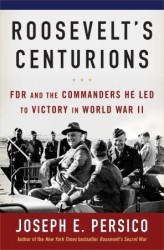
Roosevelt's Centurions
FDR and the Commanders He Led to Victory in World War II
کتاب های مرتبط
- اطلاعات
- نقد و بررسی
- دیدگاه کاربران
نقد و بررسی

September 30, 2013
No one can deny that F.D.R. was central to the Allied victory in WWII, but in his latest work, Persico (Roosevelt's Secret War) seeks to categorize how wise Roosevelt's choices were during the war. Persico wonders if Roosevelt's choices "hastened victory" or whether they "delayed the end with unnecessary death and destruction." He examines Roosevelt's susceptibility to Churchill's persistent charm offensive, and how it led to American troops landing in North Africa despite George Marshall's protests. Persico also notes that Roosevelt made the call for MacArthur to leave the Philippines, despite MacArthur's plan to stay on until the bitter end, after agreeing with MacArthurâin 1944 at the Honolulu conferenceâthat the Philippines must be retaken instead of island-hopping straight to Japan. The author does reveal surprising moments of Roosevelt's presidency, such as when he was visiting a hospital and revealed his disabled body to a ward filled with amputees, but even with his analysis Persico struggles to cover any new ground. This is a thorough account of the war, but since it fails to add to the discussion, we are left with the same portrait of Roosevelt we had before: a very capable leader in a trying time.

April 15, 2012
Whatever his flaws, Franklin Roosevelt had an eye for talent, according to this sweeping, top-down account of 1939-45 from the point of view of FDR, his cabinet and his leading generals and admirals. Opening with Gen. George C. Marshall's dramatic July 1941 confrontation with Congress over extending the draft (which passed), veteran popular historian Persico (Franklin and Lucy: President Roosevelt, Mrs. Rutherfurd, and the Other Remarkable Women in His Life, 2008, etc.) follows with a short biography of Marshall before backtracking to 1939 to begin his story. Pausing occasionally to introduce another great man (always a man), the author describes how, under FDR's benign but never inattentive authority, they directed the war from the frustrations of neutrality, the outrage and scramble to arm after Pearl Harbor and the massive if often clumsily fought campaigns. It ended with a complete but ultimately unsatisfying victory. Long wars demand long books, but these are 550 pages of lively prose by a good writer who knows his subject. It may not be the best introduction, but history buffs will find familiar material and no unsettling opinions. Persico peoples his conventional history with admirable leaders possessing well-known and forgivable flaws (MacArthur: brilliant but egotistical; FDR: brilliant but devious; Admiral King: brilliant but bad-tempered). He recounts accepted blunders (the Italian campaign was a bad idea; FDR should have paid more attention to the Holocaust) but remains neutral on persistent controversies--should we have dropped the atom bomb? Did the strategic bombing of Germany shorten the war?--merely recording opinions on both sides. A fine, straightforward politics-and-great-men history.
COPYRIGHT(2012) Kirkus Reviews, ALL RIGHTS RESERVED.

May 1, 2012
If we accept French statesman Georges Clemenceau's axiom that war is too important to be left to the generals, then there is much to be gained by the study of those political leaders who control and command the generals in wartime. Franklin Roosevelt and Stalin, commanded the most massive military machines in history, and they operated on an unprecedented global field. Persico's focus is less on the war itself than on Roosevelt's efforts to manage the men who waged the war. Although he had served as assistant secretary of the navy during WWI, Roosevelt had very little direct military experience. Yet he had long maintained a strong interest in military officers, and, when war commenced, he was determined to be a hands-on commander in chief. He was not, however, an inveterate meddler, in the mold of Churchill. As Persico illustrates, Roosevelt was wise enough to know what he did not know. His greatest success was in marshaling the varied talents and managing the egos of proud and often prickly commanders, including George Marshall, Eisenhower, and MacArthur. This is a fine addition to WWII collections.(Reprinted with permission of Booklist, copyright 2012, American Library Association.)

























دیدگاه کاربران